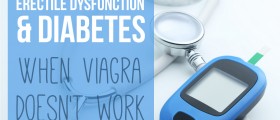
Erectile dysfunction, also known as male impotence, is a type of sexual dysfunction defined by the inability to develop or maintain an erection of the penis during sexual performance. It is important to define erectile dysfunction as a type of sexual dysfunction since many individuals affected by this disorder occasionally can achieve spontaneous erection, usually during the sleep.
Erectile dysfunction affects men of all ages and it is often caused by underlying health problems. People suffering from high blood pressure are at a high risk of developing erectile dysfunction with time. It is necessary to understand how erection works before understanding the connection between these distinct conditions.
Penile erection
A penile erection is the hydraulic effect that occurs when the blood enters the penile area and becomes retained in a sponge-like tissues found inside of the male reproductive organ. Penile erection is a complex physiological phenomenon that depends on interaction of many neural, psychological, endocrine and vascular factors.
Two chambers of spongy tissues, called corpora cavernosa, are found on both sides of the penis. This tissue is made of small arteries, veins and muscles that relax before the erection, to allow a rush of blood into the penis. The blood then becomes trapped inside of the organ and the penis expands and becomes hard.
High blood pressure and erectile dysfunction
High blood pressure, also known as hypertension, is a chronic cardiac medical condition characterized by elevated levels of systemic arterial blood pressure. Prolonged hypertension is associated with many serious diseases such as stroke, myocardial infarction, heart failure and arterial aneurysm. It is also one of the major causes of erection problems.
About 50% of men aged 40 to 79, who have high blood pressure, also have erectile dysfunction. Hypertension affects male sexual function by affecting the health of arteries. High blood pressure actually keeps the arteries that carry the blood to the penis from dilating and therefore makes the smooth muscles in penis to lose their ability to relax. This means that not enough blood will flow to the penis, and erection will gradually become impossible.
Another important feature about high blood pressure is that it negatively affects the levels of testosterone in the blood. Testosterone is a key male hormone that is also responsible for libido levels and reproduction.
Various drugs used in treatment of hypertension are also known to cause male impotence. For example, beta-blockers can affect nerve impulses that lead to erecting, while diuretics decrease the total volume of blood and therefore limit the blood flow into the penis.




_f_280x120.jpg)

_f_280x120.jpg)
_f_280x120.jpg)









Your thoughts on this
Loading...